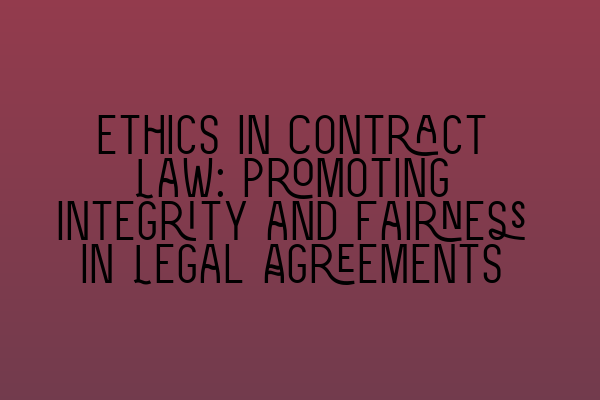Ethics in Contract Law: Promoting Integrity and Fairness in Legal Agreements
Contracts are the backbone of business transactions and legal agreements. They provide a framework for parties to establish their rights and obligations, ensuring that both sides are protected and treated fairly. However, the integrity and fairness of these contracts are heavily reliant on the ethical practices of solicitors and legal professionals involved.
In this blog post, we will explore the importance of ethics in contract law and how they promote integrity and fairness in legal agreements. We will also discuss the role of solicitors in upholding these ethical standards and the impact it has on their reputation and practice.
The Role of Ethics in Contract Law
Ethics play a crucial role in contract law as they govern the behavior and actions of solicitors and legal professionals during the negotiation, drafting, and execution of contracts. Ethical conduct ensures that all parties involved are treated fairly and that the terms of the contract are clear, unambiguous, and enforceable.
Integrity and fairness are the cornerstones of ethical behavior in contract law. Solicitors are expected to act in the best interests of their clients while maintaining honesty, transparency, and professionalism throughout the contract drafting process. This includes disclosing any potential conflicts of interest, providing full and accurate information, and ensuring that the terms of the contract are fair and reasonable for all parties.
By adhering to ethical principles, solicitors not only uphold the integrity of the legal profession but also contribute to the overall fairness and effectiveness of the contract. Ethical conduct builds trust between parties, minimizes the risk of disputes, and promotes long-term relationships based on mutual respect and cooperation.
Key Ethical Considerations in Contract Law
When handling contract matters, solicitors must navigate various ethical considerations to ensure the integrity and fairness of the agreement. Here are some key ethical principles and guidelines that solicitors should adhere to:
1. Conflict of Interest
Solicitors must identify and address any potential conflicts of interest that may arise in contract negotiations. This includes situations where solicitors have a personal or financial interest that may affect their ability to act in the best interests of their clients. Ethical solicitors prioritize their clients’ interests above their own and take necessary steps to avoid conflicts or disclose them if they cannot be avoided.
2. Confidentiality
Confidentiality is a fundamental principle of the solicitor-client relationship. Solicitors must maintain strict confidentiality concerning the information shared by their clients during contract negotiations. This ensures that clients can freely disclose relevant details without fear of unauthorized disclosure or misuse of their information.
3. Professional Competence
Solicitors have a duty to provide competent and diligent legal representation to their clients. This includes having a solid understanding of contract law, keeping up to date with relevant legal developments, and applying their knowledge effectively when drafting and reviewing contracts. Ethical solicitors continuously invest in their professional development and take steps to enhance their legal skills and expertise.
4. Clear Communication
Contracts should be drafted in clear and understandable language to avoid confusion or misinterpretation. Ethical solicitors communicate effectively with their clients and other parties involved to ensure everyone understands the terms and conditions of the agreement. They should also provide thorough explanations of complex legal concepts and advise their clients on the potential risks and implications of the contract.
The Impact of Ethics on Solicitors
Upholding ethical standards in contract law not only promotes fairness and integrity but also has a profound impact on the practice and reputation of solicitors. Ethical solicitors are trusted by their clients and are more likely to attract new clients through positive word-of-mouth recommendations.
By consistently demonstrating ethical behavior, solicitors can build strong relationships with their clients, fostering loyalty and repeat business. Clients appreciate solicitors who prioritize their best interests and are committed to providing transparent and reliable legal advice. Not only does this benefit clients, but it also enhances the solicitor’s professional reputation and credibility within the legal community.
Additionally, solicitors who adhere to ethical principles are less likely to face legal challenges or complaints. They are prepared to navigate complex legal issues and avoid potential pitfalls that could arise from unethical conduct. By prioritizing integrity and fairness, solicitors maintain the highest standards of excellence, ensuring their clients’ trust and satisfaction.
Conclusion
Ethics in contract law are crucial for promoting integrity and fairness in legal agreements. Solicitors play a pivotal role in upholding these ethical standards, ensuring that clients’ best interests are protected and that contracts are clear, enforceable, and fair. By prioritizing ethics, solicitors not only enhance their professional reputation but also contribute to the overall effectiveness of the legal profession.
To learn more about navigating legal challenges and pitfalls in your legal practice, please read our related article: Navigating Legal Challenges and Pitfalls in Your Practice.
For a comprehensive comparison between barristers and solicitors, check out our related article: Barrister vs. Solicitor: A Comprehensive Comparison.
Interested in exploring different solicitor specializations? Find your niche by reading our related article: Exploring Different Solicitor Specializations: Finding Your Niche.
For our top recommendations on law schools in the UK, please visit our related article: Top Recommendations for Law Schools in the UK.
Embrace the rise of virtual law practices with insights from our related article: Embracing the Rise of Virtual Law Practices.
